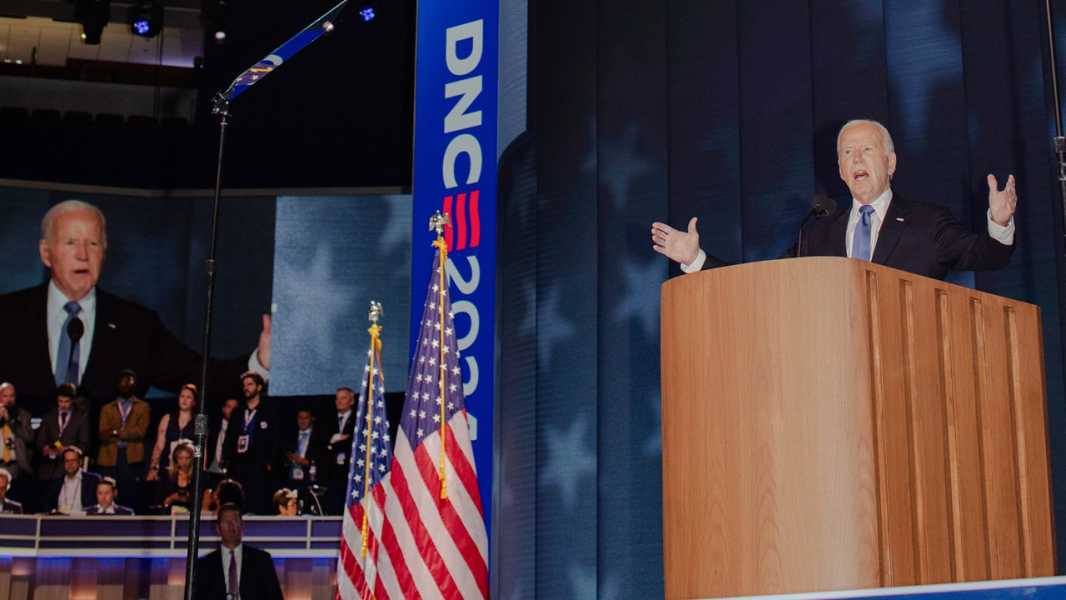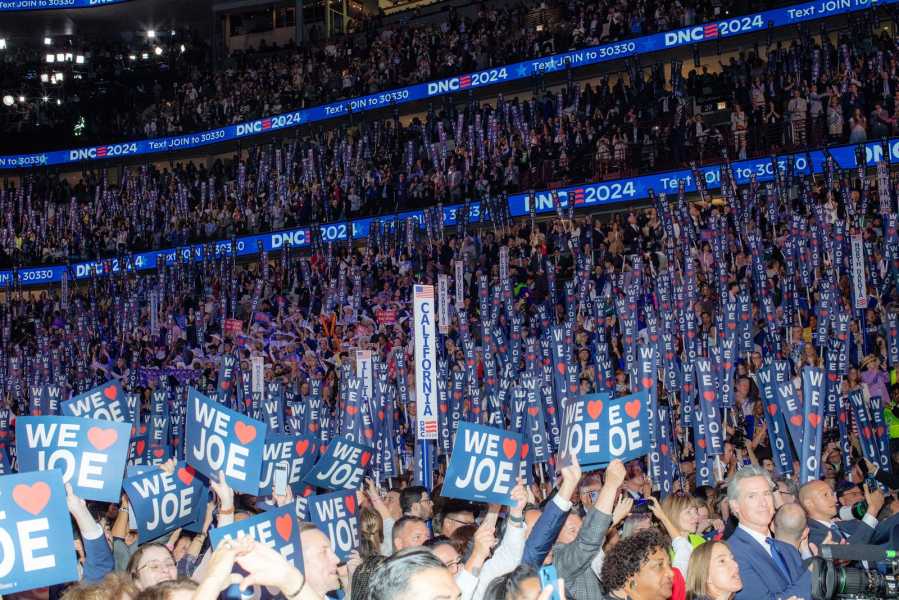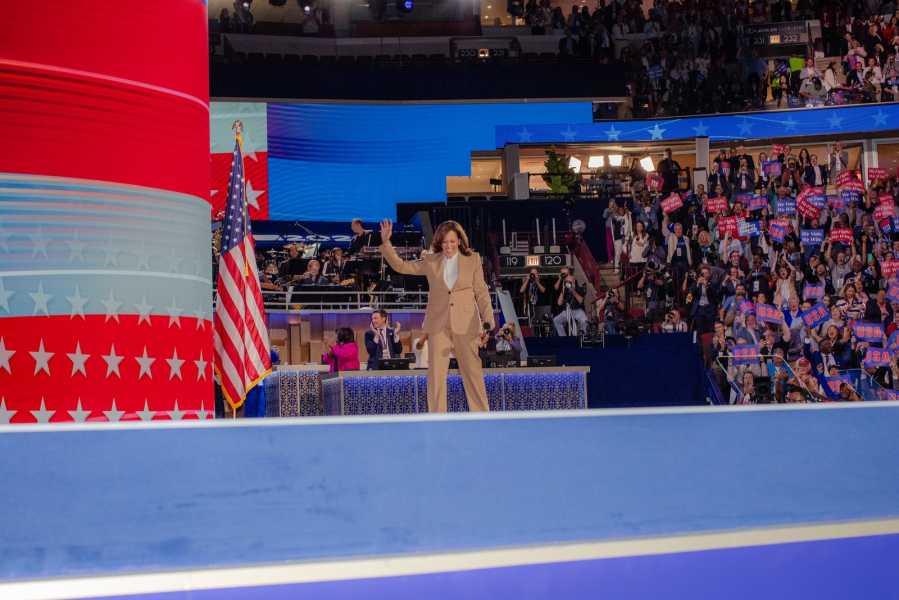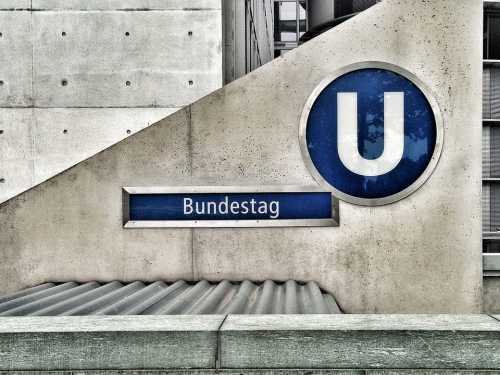
Save this storySave this storySave this storySave this story
For years, Joe Biden has told fellow-politicians, with rueful wisdom, “You’re either on the way up or you’re on the way down.” But after making the rarest choice in politics, he fits neither description; he is, for the moment, helping someone else on the way up, and gingerly managing his own way down.
On Monday night, in Chicago, Biden stepped onto the stage in front of thousands of delegates at the 2024 Democratic National Convention, an event that was to be a coronation for the final election of his life, another race against Donald Trump. Instead, with seventy-eight days to go, he was there to hand off the prize he once coveted, the nomination now about to be bestowed on his Vice-President, Kamala Harris. As a matter of history, it was a scene no living American has ever witnessed. The last President to be denied his party’s nomination for reëlection was Chester Arthur—and he left office in 1885. (President Lyndon Johnson withdrew from contention in 1968 long before the convention.)
The Lede
Reporting and commentary on what you need to know today.
Onstage, Biden insisted that his speech was not a goodbye. “I’ve got five months left in my Presidency,” he said. “I’ve got a lot to do.” But as a personal and political matter it signified the end of Biden’s quest, reaching back more than five decades. In 2020, as a candidate, Biden talked of being a “bridge” to the next generation. But, by the time he entered the White House, in 2021, he had put aside the idea of relinquishing power any sooner than the Constitution required. “I intend to run,” he told an interviewer the following year, “but it’s much too early to make that kind of decision. I’m a great respecter of fate.”
The mysteries of fate—the cruelties and gifts and curious turns—have always permeated Biden’s life and thoughts. As a young man, he adopted his father’s flinty belief that nobody is so lucky as to be spared the worst of life. (Biden has long kept a cartoon near his desk of Hägar the Horrible asking the heavens, “Why me?” To which a celestial voice responds, “Why not?”) For decades, his political and personal fates have been entwined in his imagination. In 2015, while Biden’s son Beau was stricken with brain cancer, Barack Obama gently urged him to consider a satisfied retirement instead of another run for President. It “wasn’t that simple for me,” Biden later wrote, in his memoir, “Promise Me, Dad,” because “the question of running for president was all tangled up in Beau, and purpose, and hope.” Giving up on one felt like giving up on another. “The mere possibility of a presidential campaign, which Beau wanted, gave us purpose and hope—a way to defy the fates,” he wrote. (Beau died later that year.)
Biden sometimes invoked his father’s belief in a kind of “zero balance” in the cosmic ledger of good fortune and bad, a tension between the downward pressure of tragedy and the upward thrust of will. Biden savored a line written by his friend John McCain, in a memoir called “The Restless Wave,” published while McCain was succumbing to brain cancer. “I have lived with a will,” McCain wrote. “I served a purpose greater than my own pleasure or advantage.” Stepping away, in Biden’s imagination, was an admission that will power could take him only so far, a defeat when the things he considered most precious—democracy, his contributions to public service, the future of the liberal project—were most at risk.

A mood of giddy, guarded optimism dominated the convention hall. Conversations revolved around how rapidly the Party’s prospects seemed to have changed, and the arena echoed with chants of “U.S.A.!” At an event on the sidelines, Chauncey McLean, the president of Future Forward, the main outside-spending group backing Harris’s Presidential bid, warned against complacency. The group’s in-house opinion surveys, McLean said, were “much less rosy” than the public polls, and he cautioned that Democrats face very close races in critical states. But McLean left little doubt that the outlook had improved, noting that, before Biden dropped out, the group had concluded that his chance of winning was in the single digits.
For Biden, the recent, sudden surge of enthusiasm among Democrats has been a barbed blessing; victory now seems far more likely, but there’s little doubt how desperate Democrats were for him to step aside. Over and over, the crowd rewarded him with ovations and chants of “Thank you, Joe!” In the hours before Biden went on, one speaker after another seemed to be competing for who could praise him most lavishly. The acclaim occasionally bordered on patronizing, and Biden, one suspects, knows it; his nerve endings are especially attuned to the personal gestures and slights of politics. But, most of all, the sentiment was one of relief and gratitude.
Throughout the night, there was plenty of red meat for the faithful. The delegates watched a video of a man named Rich Logis, a former Trump voter, who said, “I finally stepped outside the MAGA echo chamber. I stopped listening to what Trump said, and looked around with my own eyes.” He went on, “I made a grave mistake. But it’s never too late to change your mind.” Another video called “Two Lies and a Lie” lampooned Trump as someone who “talked a big game but actually lost a hundred and seventy-eight thousand manufacturing jobs.” Joyce Beatty, an Ohio congresswoman, spoke of J. D. Vance, the senator from her state. “As soon as he could, he ran away to Yale and Silicon Valley,” she said, “cozying up with billionaires.” Hillary Clinton, with a look of relish, said, “Donald Trump fell asleep at his own trial!” The crowd erupted in chants of “Lock him up,” which Harris makes a point to tamp down at her rallies. But Clinton is not running for anything; smiling, she let the chants continue.
For much of the night, Biden was a quiet presence in the programming. A video about the Administration’s response to the pandemic cut from Trump talking about putting disinfectant in people’s bodies to a clip of Harris declaring, “Help is on the way.” The schedule called for more than fifty speakers, performers, and videos. By the time Biden appeared, it was long past eleven o’clock on the East Coast.
From the earliest moments, his speech shifted the tone in the arena. Introduced by his daughter Ashley, he emerged from backstage wiping tears from his eyes, embraced her, and turned to the crowd, basking for a long moment in chants of gratitude. “I love you!” he said. The speech that followed was a valedictory, mapping the arc that he hopes will form the center of his legacy, the story of America passing from a moment of national peril to one of possibility. He conjured the depths of the pandemic, and the horror of January 6th: “I stand before you now on this August night to report that democracy has prevailed.” He spoke of legislative gains—on drug prices, climate change, gun control, infrastructure—that will endure beyond the careers of the politicians who achieved them. He repeatedly introduced his Administration’s wins with the phrase “I’m proud”—a small reminder of how hard it had been for him to walk away. Biden sometimes seemed to slip into the oratory of the address that some piece of him still hoped to give—the acceptance of the nomination!—before catching himself and veering back to celebrate Harris, by adding the phrase “Kamala and I.” He spoke only obliquely of the decision not to seek the Presidency again, saying, in a line that contrasts well with the Republican nominee, “I love the job, but I love my country more.”

Biden stumbled, at times, over a word or a phrase. But those slips no longer carried the significance they did a month ago; they no longer left listeners in a white-knuckled panic. He seemed, to borrow a phrase, a bit unburdened by what has been. In a gentle way, the hiccups even served as proof of concept, a reminder that, had the Democrats not changed course, the liabilities of his candidacy would still be there. Now that he’d been removed from the perilous context of the Presidential race, it was possible to see him differently for the first time in years, not as a man struggling to stay at the top, but as a man whose career describes a half century of American history—a politician who awoke to politics when Martin Luther King, Jr., was alive, who worked with segregationist senators, and went on to join the ticket of the first Black President. Later, he put the child of biracial parents on his own ticket. In office, they put the first Black woman on the Supreme Court, and carried out legislative goals that had been on Democrats’ wish list for as long as he had been in politics.
Nobody wants to be seen giving a farewell speech until they are truly saying farewell—least of all with five months to go—but this was a chance for Biden to leave Americans with a more dignified impression than the one they had after the debacle on the debate stage in June. As he neared the end of his remarks, it was impossible not to take note of how truly unusual his withdrawal is in a profession that can seem hopelessly hobbled by ego and self-enrichment. It was tempting to wonder how many of his peers might have held on to the end, come what may.
In this final lap, Biden asked to be remembered as a man who pulled the country from the maw of tragedy—from the perils of COVID, of Trump, of total paralysis in Washington. For a while—a long, nerve-racking while—it seemed that he might mar the end of his career in public service with an unwillingness to accept reality. It won’t be clear if he succeeded until the votes are cast in November. Until then, his is an unfinished story—not quite a tragedy, not yet a redemption. But, on this evening, he wound down his speech with a favorite lyric, by Gene Scheer: “America, I gave my best to you,” he said.
When he was done, Jill Biden stepped out from backstage, followed by Harris and her husband, Doug Emhoff. Above their heads, the balloons remained pinned to the ceiling, a reminder that the nominee has yet to speak. Later this week, Harris will deliver a version of the speech that Biden thought he would be giving. But Biden won’t be there to see it. He will be, his aides say, on vacation with his family, near Santa Barbara, California, watching the proceedings, like other Americans, on television. ♦
Sourse: newyorker.com






